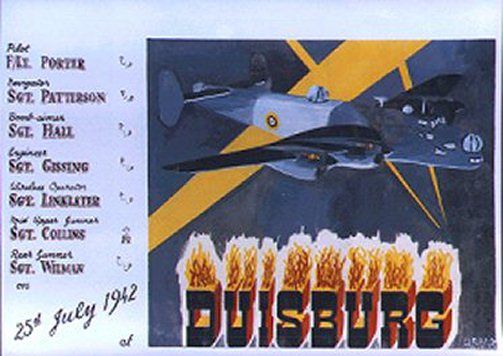 Previous Section |
 Go Back to Chapter Headings |
 Next Section |
(Click here to read diary excerpts of this march by another long time member of the Lamsdorf Camp)
Another detailed account of this march by Richard Fusniak can be found at THIS link.
As 1944 drew to an end, we were told that in all probability, the Stalag
would be evacuated and we would all be marched out, presumably to the West.
Everyone tried to hoard some biscuits or food, and also made back packs of
anything available. Apparently some people made sleighs, but I never saw any,
and there was nothing in the camp to make sleighs out of. As January 1945 wore
on we heard of work parties and camps in Poland that were already on the march.
So, we were waiting. We were told on January 21st, that we would be moving out.
On January 22nd we were told to be ready. In early evening, as darkness fell, we
were formed up and ordered out. At the gate we were given a Red Cross parcel. We
tried to carry it but as we were being force marched and it was bitterly cold
with deep snow-covered roads, most of the parcels were scattered along the way.
After a few hours men started to fall by the wayside, we were in poor shape
caused by malnutrition and our stamina was low. As they dropped in the snow we
were forced to march by and leave them. Les Nichols, Johnny Kermylo's gunner,
was one chap I saw go down.
We slept in barns and it was really a
survival thing. Your boots got wet while marching and if you took them off at
night, they froze and if you left them on, your feet froze. The only alternative
was to put them close to your body and if the straw was deep enough, bury them
and sleep on top of them. The first few days and nights I was with an R.A.F.
chap, called Collins, he had cut the bottom off his great coat which was good
for marching but poor for cover at night.
Then I teamed up again with my
old comrade Mem. We were lucky if we got a bit of soup at night, so things were
very grim, as we would go for as long as three days with no food. It became a
matter of surviving. After ten days or so we came to a POW Stalag at Gorlitz.
The British, Canadians, etc. had been moved out and there were Americans there.
They had been captured at the Battle of the Bulge in December, 1944. They were a
demoralized bunch and as they met us they asked if we had any candy bars. Here
we were lousy, starving, unwashed men, but our moral and spirits were obviously
better than theirs. One of their sergeants told me that his unit had surrendered
without firing a shot at the enemy.
We were at Gorlitz a few days, we got
some midday and evening soups here. Mem and I told some Americans that the
Germans didn't like POWs especially Americans and that we had been POWs for
years and we knew how to handle them. To help them, we would trade our short
unlined British battle dress for their parkas and then the guards might treat
them better. So we ended up getting lined, knee length parkas in exchange. They
were a great help to us.
 Previous Section |
 Go Back to Chapter Headings |
 Next Section |